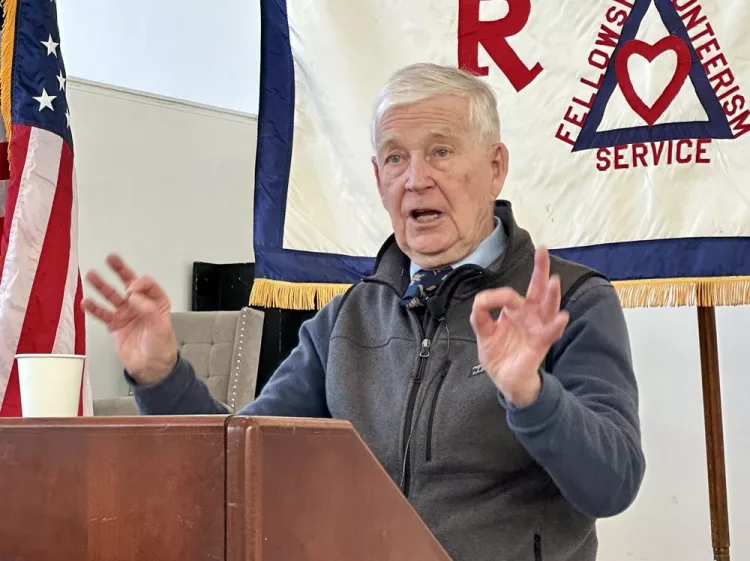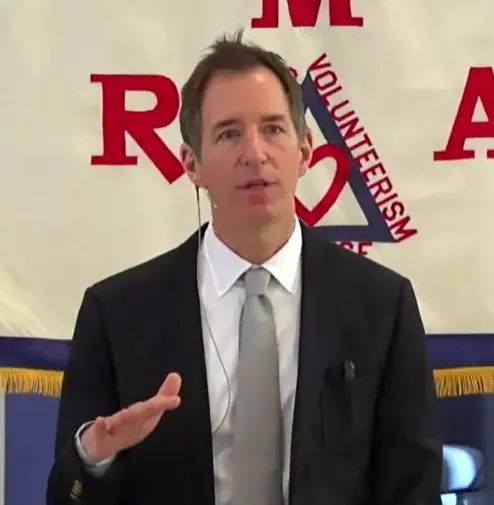
By Mike Abrahams
At the January 22nd Retired Men’s Association public speaker program Hollister Sturges introduced Robert Henrey, a scholar with a long career in finance at Coopers & Lybrand, and a lifelong interest in history and linguistics, who delivered a captivating lecture on the fascinating journey of a Chinese scholar to the West in the 17th century. The talk centered around Henrey’s book, “Shen’s Unlikely Journey: From Confucian China to the Court of Louis XIV,” which explores the first documented visit of an educated Chinese person to Europe.
Henrey’s interest in this subject stemmed from his personal experiences living in Asia, particularly his time in Singapore and a month-long stay in Shanghai in 1980. These experiences gave him unique insights into the complex relationship between China and the West, which he noted has not changed significantly since the 17th century. Many of the problems and perceptions that were operative then—suspicion, mistrust, etc.—are still very operative today. It is an interesting story not only for the history but also for how we understand each other today.
The story Henrey uncovered was remarkable for several reasons. It represented the first instance of an educated Chinese person, as opposed to a slave, visiting and being welcomed in the West. This visit occurred only 300 years ago, highlighting the relatively recent nature of meaningful cultural exchange between China and Europe. The Chinese scholar’s journey was immortalized in a portrait commissioned by King James II of England, painted by the renowned artist Godfrey Kneller, who had studied under Rembrandt. This portrait, the first of a Chinese person in Western art, served as a tangible connection to this groundbreaking cultural exchange.
Henrey explained that the scholar’s visit was orchestrated by Jesuits, who at the time were the primary Western presence in China. The Jesuits brought the young man to Europe as a form of propaganda, showcasing their work in China and demonstrating the potential for meaningful relationships with the vast and largely unknown country.
To provide context for the historical period, Henrey highlighted the stark differences between the 17th century world and our present day. He noted that the global population was only about 500 million at the time, compared to today’s eight billion. This vast difference in scale underscored how different the world was during the time of the Chinese scholar’s journey. Henrey also discussed the historical reasons for the limited contact between Europe and Asia prior to this period. Islamic control over the shortest routes to Asia, including the Silk Road, had created a bottleneck that was only broken when Portuguese explorers managed to sail around the Cape of Good Hope. This maritime achievement revolutionized Western access to China and other parts of Asia.
Henrey emphasized the self-contained nature of Chinese culture, which historically showed little interest in looking to the West for inspiration. He attributed this to China’s unique characteristics: a unified language, a centralized political system, and a culture that looked inward rather than outward. The Confucian concept of a divinely mandated, centralized society further reinforced this introspective cultural tendency. He emphasized the remarkable political and cultural continuity of Chinese civilization, spanning nearly 4,000 years. This continuity, unparalleled in any other civilization, contributed to China’s self-sufficient worldview and its limited interest in external cultures.
The Portuguese, despite being a small nation on the edge of Europe, played a crucial role in breaking the Muslim stranglehold on East-West contacts. Their maritime skills allowed them to establish trade routes to India, Japan, and eventually China. However, China proved to be their most challenging endeavor due to its closed culture and lack of interest in Western offerings.
A significant breakthrough came in 1557 when the Portuguese persuaded the Ming dynasty to allow a trading post on the Chinese coast. This concession was primarily motivated by China’s desire for silver, which they received in exchange for silk and porcelain. The silver, originating from the New World, made its way to Europe and then to China, establishing a global trade network.
Throughout his lecture, Henrey drew parallels between historical events and contemporary issues, emphasizing that despite the vast changes in the world over the past three centuries, many of the fundamental challenges in China-West relations remain similar. He highlighted the continuing importance of understanding and bridging cultural gaps between China and the West, a task that remains as relevant today as it was during the time of the Chinese scholar’s unprecedented journey. By examining this early cultural exchange, he offered a unique perspective on the historical roots of current global dynamics, demonstrating the enduring relevance of studying such pivotal moments in history.
The talk can be viewed by going to the RMA website at https://greenwichrma.org, and clicking on “Speakers.”
The RMA’s upcoming presentation, “The Age of Trump: Early Reflections and Predictions for the Second Trump Presidency” by Susan Herbst, is scheduled for 11 AM on Wednesday, February 5, 2025. Please note that this and all future RMA presentations will be held at Christ Church Greenwich, Parish Hall, 254 E. Putnam Avenue, Greenwich, CT 06830.
While political scientists have refrained from calling the past few years a major political “realignment,” it is indisputable that we live in the “Age of Trump.” President Trump has profoundly transformed American political culture, from our perspectives on traditional institutions to the nature of our political discourse, and everything in between. But what does all of this change mean for the citizenry and our democracy? And what might we expect from Trump and his administration in these very early weeks? Professor Herbst will bring what she knows from the field of political science, but please be ready with your own reflections and predictions: Academics certainly haven’t been right about a lot when it comes to predictions about American politics!
Dr. Herbst was appointed as the 15th president of the University of Connecticut in 2010 by the University’s Board of Trustees. She stepped down as president in 2019 and returned to the faculty. She teaches at the Stamford campus where she is University Professor of Political Science and President Emeritus. Prior to her appointment to the presidency, Dr. Herbst served as Executive Vice Chancellor and Chief Academic Officer of the University System of Georgia where she led 15 university presidents and oversaw the academic missions for all 35 public universities in Georgia. Before coming to Georgia, she served in a number of progressively challenging academic posts.
Born in New York City and raised in Peekskill, NY, Dr. Herbst received her B.A. in Political Science from Duke University in 1984 and her Ph.D. in Communications Theory and Research from the University of Southern California’s Annenberg School of Communication in 1989. She is the author of five books, her newest being “A Troubled Birth.”
To stream the presentation by Dr. Herbst at 11 AM on Wednesday, February 5, click on https://bit.ly/30IBj21. This presentation will also be available on local public access TV channels, Verizon FIOS channel 24 and Optimum (Cablevision) channel 79. The public is also invited to attend the presentation in person at Christ Church Greenwich, Parish Hall, 254 E. Putnam Avenue.
Note: The views expressed in these presentations are those of the speakers. They are not intended to represent the views of the RMA or its members.
RMA speaker presentations are presented as a community service at no cost to in-person or Zoom attendees, regardless of gender. Any member of the public who would like to receive a weekly email announcement of future speakers should send a request to members@greenwichrma.org. The RMA urges all eligible individuals to consider becoming a member of our great organization, and thereby enjoy all the available fellowship, volunteer, and community service opportunities which the RMA offers to its members. For further information, go to https://greenwichrma.org/, or contact info@greenwichrma.org.



